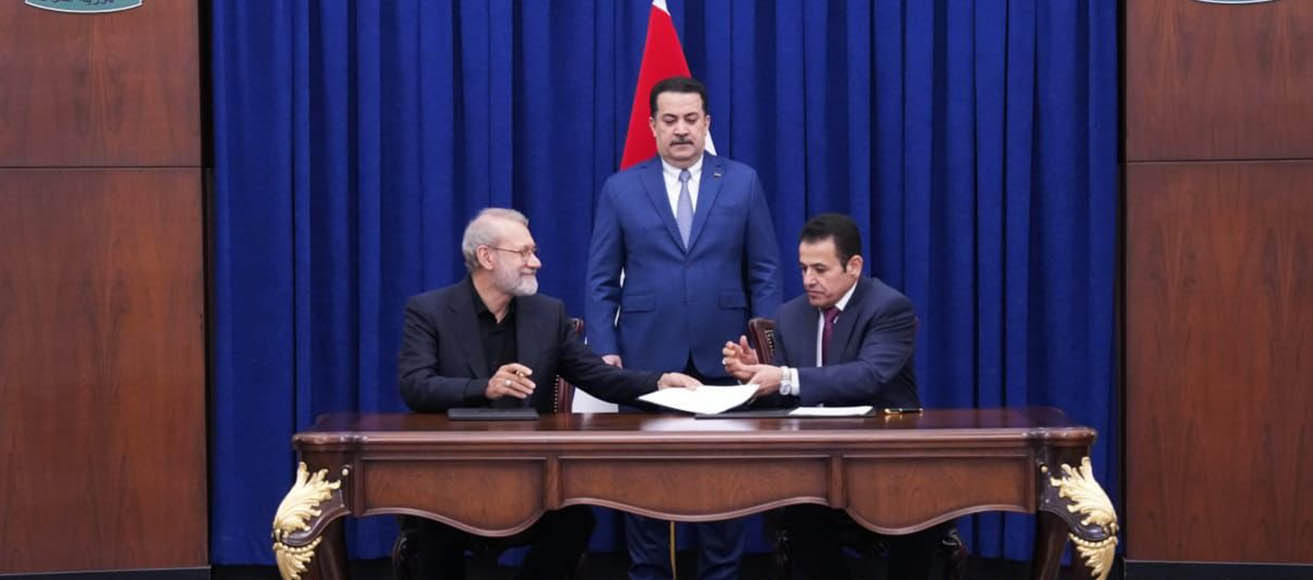Iraq, Iran Sign Key Border Security Pact Amid High-Level Talks
Iraq and Iran signed a key border security agreement in Baghdad, supervised by PM Sudani. The pact, a focus of Iranian security chief Ali Larijani's visit, aims to enhance coordination and prevent aggression, while both nations also discussed advancing major economic projects.

ERBIL (Kurdistan24) — In a significant move to bolster bilateral cooperation and manage regional tensions, Iraq and Iran have signed a joint security memorandum of understanding focused specifically on coordinating the security of their shared border. The signing ceremony, which took place in Baghdad on Monday, was supervised by Iraqi Prime Minister Mohammed Shia Sudani and attended by a high-ranking Iranian delegation led by Ali Larijani, the newly reappointed and influential Secretary-General of Iran's Supreme National Security Council (SNSC).
The formal signing of the security pact was the centerpiece of a high-stakes visit by Larijani to Baghdad, a trip aimed at reinforcing strategic ties, discussing new regional developments, and advancing economic projects.
The Prime Minister's Media Office issued a statement detailing the high-level meeting between the two sides. During the discussions, Prime Minister Sudani stressed "Iraq's continuous efforts to develop their relations with the Islamic Republic in various fields, in a way that serves the interests of both the Iraqi and Iranian peoples."
He also took the opportunity to reiterate Baghdad’s clear and "firm and steadfast position regarding the rejection of countries' aggression against Iran and everything that leads to the escalation of conflicts at the regional and international levels." In a notable diplomatic signal, the Iraqi premier also reiterated his country's support for the American-Iranian dialogue.
The security memorandum was formally signed by Iraq's National Security Advisor, Qasim al-Araji, and his Iranian counterpart, Larijani.
While specific details of the agreement were not made public, it is understood to be a critical component of a broader effort to prevent threats along the long and often sensitive border between the two nations. This move formalizes security coordination and represents a key deliverable from Larijani’s visit.
For his part, Larijani, a veteran politician who has previously served as Speaker of Parliament and as an advisor to the Supreme Leader, conveyed the greetings of Iranian President Masoud Pezeshkian to Prime Minister Sudani. He emphasized his government's eagerness for the "development and continuation of relations in various fields."
He specifically highlighted major infrastructure projects as a priority, including connecting the railway line between the two countries for the transport of travelers and linking it to Iraq’s ambitious Development Road project and other regional transit corridors.
In a separate meeting between the two national security chiefs, al-Araji provided a firm assurance to his Iranian counterpart. According to a statement from his office, the Iraqi National Security Advisor stressed that "the Iraqi government is working seriously to prevent any security violation aimed at aggression against any of the neighboring countries."
This commitment directly addresses a key Iranian concern and forms the foundation of the newly signed security pact.
The two officials also discussed the implementation of the agreement, the broader security situation in the region, and what they termed "the crimes of starvation and killing of the Palestinian people in the Gaza Strip," with both sides stressing the importance of the international community taking a stand to stop these crimes.
Larijani praised the foreign policy of the Iraqi government, which he said has led to security and stability for both Iraq and the wider region.
In comments made at a press conference prior to his arrival in Baghdad, Larijani had framed the visit as a pivotal moment in the bilateral relationship. He described relations as being at a "high level," citing the warm welcome extended by Iraq to Iranian pilgrims during the Arbaeen of Imam Hussein as a prime example.
"We are in the process of formulating a security agreement with Iraq, and this is a very important point," he stated. He articulated Iran's core security doctrine regarding its neighbors, saying, "In Iran's relations with neighboring countries, Iran's security will be the main point, while taking into consideration the security of neighboring countries."
He drew a contrast with other nations, noting, "our relations are not like the relations of some countries that only care about their own security." He had also revealed ahead of the trip that new agreements would be signed and that he would hold discussions with a "large number of senior Iraqi officials who are our friends."
According to Iranian media, Larijani’s trip is not limited to Iraq. Following his discussions in Baghdad, he is also scheduled to travel to Lebanon.
His agenda there is expected to focus on developing trade relations and discussing security changes with senior Lebanese officials. Regarding Lebanon, Larijani has stated that his country’s position is "clear and obvious," emphasizing that "the people of Lebanon must be united" and that "Lebanon's independence has always been an important point for Iran."
